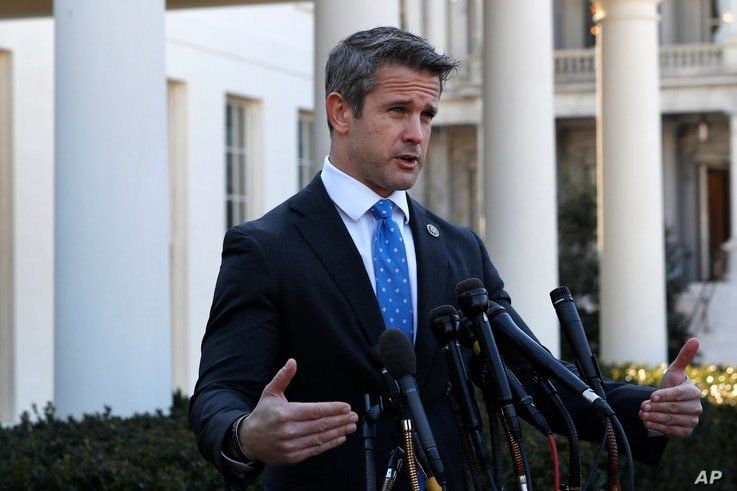Republican Congressman Faces Blowback for Anti-Trump Stance
Amid freezing temperatures and falling snow, about 100 Illinois Republicans turned out to turn against one of their own.
“We are mad, we are furious, and we will never vote for him again,” Shirley Prescott told VOA. The focus of her anger, and that of the others braving a frigid day in Ottawa, Illinois, was U.S. Representative Adam Kinzinger.
Now serving his fifth term representing a district outside Chicago, Kinzinger voted to impeach Donald Trump after a mob of the former president’s supporters assaulted the U.S. Capitol January 6. Once regarded in the party’s mainstream, he wants Republicans to move past what he regards as Trump's dishonest and destructive brand of politics.
"The Republican Party has lost its way," Kinzinger said in a video message posted to a website for his new political action committee. "Hope has given way to fear … poisonous conspiracy theories and lies. This is not the Republican road.”
It is not a message well-received by some Republicans in his district.
“Our congressman is, in our opinion, gone off the rails and said things we don’t agree with,” said Larry Smith, chairman of the LaSalle County Republicans in his district. “We are absolutely not in agreement with Adam.”
Despite no evidence of widespread voter fraud and the fact that Trump, like Kinzinger, carried LaSalle County, Smith has taken part in lawsuits challenging mail-in ballots in Illinois.
"The election, locally, was wrong,” he said. “It was mismanaged, and it did not represent the voice of the people.”
Trump delivered a similar message about alleged voter fraud nationally on January 6 before a mob stormed the U.S. Capitol. Smith, like Trump, is not backing down from unsubstantiated claims of irregularities and remains an ardent backer of the former president.
“There’s enormous support for Trump, and for what he did [during his term as president],” Smith said.
Diverging opinions
But local Republican opinion is not unified.
“Trump has hurt the party,” said Susan Thornton, Smith’s predecessor as chair of the LaSalle County Republican Party. “It’s been a disaster for the party, and I can’t understand why people can’t recognize that.”
Thornton is firmly at odds with the current Republican direction and leadership, both locally and nationally.
" 'Proud to be a Republican.’ I can’t see anyone saying that right now, after what has happened. I can’t see it,” she said. “Who could be proud of this, of these people running around in red hats and being mean to other people for no reason other than they don’t love Trump?”
The fight over the direction of the Republican Party in the wake of Trump’s 2020 national election loss and the January 6 assault on the Capitol is playing out in several congressional districts like Kinzinger’s across the United States.
Thornton's and Smith’s opposing views illustrate the growing fault line in a party where tens of millions of voters remain intensely loyal to a former president many others view as toxic.
Now an independent, Thornton nevertheless backs Kinzinger and nine other Republican lawmakers in the House who voted to make Trump the first U.S. president twice impeached. She texted Kinzinger after his impeachment vote. “I said I hope we’re still friends, and I commend you for taking a stand. However, I wish it would have been earlier.”
Thornton said she understood that voting for impeachment was a difficult decision.
“It did take courage,” she said. “It did.”
Taking aim at anti-Trump Republicans
It could also put political careers in jeopardy.
Smith wants local Republicans to replace Kinzinger in the next election cycle, as do some rank-and-file Republican voters in the districts of all 10 House Republicans who voted to impeach last month.
“Kinzinger has earned himself a primary [challenge],” he said.
Analysts see a political party battling itself – and potentially weakening itself.
“This kind of schism over the loyalty to Trump, I think, creates the opportunity for potentially more [primary] challengers [in 2022],” Northwestern University political scientist Laurel Harbridge-Yong told VOA during a recent Skype interview.
She added that banishing anti-Trump Republicans could make the party less palatable to the general voting public.
“It points to how members are more focused on a small number of people in their constituency — their primary electorate, and even within that, an ardent base — whose interests might not be the same as the rest of their constituents,” Harbridge-Yong said. “It means that legislators are acting in the interests of a small minority rather than the interests of the majority of their constituents, much the less the majority of the country as a whole.”
Kinzinger again became a focus of attention when he joined 10 House Republicans and the Democratic caucus to reprimand Republican Representative Marjorie Taylor Greene of Georgia, who in the past encouraged violence against her Democratic colleagues and espoused radical conspiracy theories.
Passage of the resolution this past week allowed lawmakers to strip the first-term legislator of two coveted committee assignments. In casting the vote, Kinzinger bucked House Republican leader Kevin McCarthy, who had called the effort to remove Greene from committees a "partisan power grab."
Kinzinger’s office weighs in
Voice of America contacted Kinzinger for an interview to discuss his Country 1st initiative and his reasons for taking a stand against Trump. His spokesperson, Maura Gillespie, responded.
“The congressman felt compelled to speak out because remaining silent about what’s been happening was no longer an option he could live with, quite frankly,” Gillespie said. “Congressman Kinzinger knows there are great risks in standing up like this, but he’s at peace with his choice and ready to face whatever may come his way.”
Thornton said she believed Kinzinger has support from a majority of Republican voters in his district who are less vocal and less outspoken about their political opinions.
“I think we have far more decent people in the 16th Congressional District than we have these violent Trump supporters,” she told VOA, adding that Kinzinger’s vote to impeach Trump and move the Republican Party in a different direction also has the support of local voters outside the party.
“Democrats are looking, I think, at Adam a little different … that he’s somebody they could support maybe for a higher office,” she said.
Thornton welcomed Kinzinger’s battle to reform the party but said more would be needed before she would consider herself a Republican again.
“They would have to disavow Trump as a leader and a messenger, because his message is not acceptable to me," she said. "We’d have to get back to decency and respect.”
Trump loyalists, meanwhile, say they are planning more events across the United States targeting lawmakers like Kinzinger, pledging to reshape the party in Trump’s image, one primary election at a time.
 Biden Announces Diplomacy Shift in YemenNext videoRussia Rejects Navalny ‘Ultimatum’ From Biden
Biden Announces Diplomacy Shift in YemenNext videoRussia Rejects Navalny ‘Ultimatum’ From Biden








